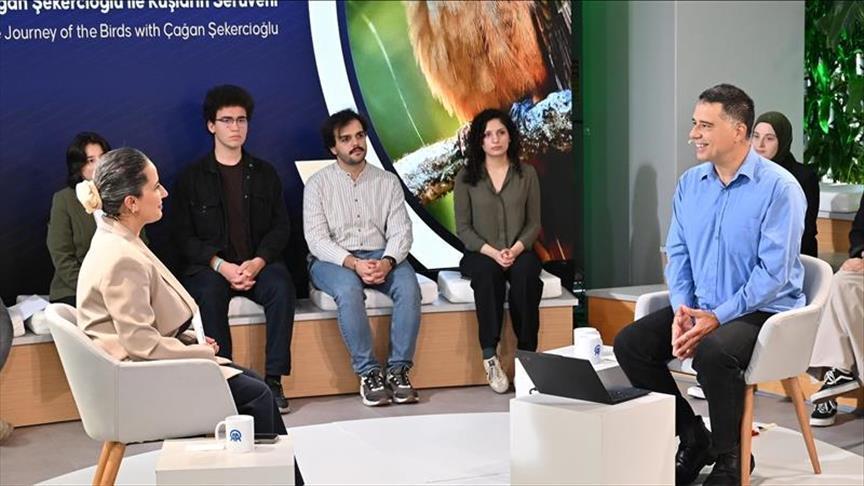The event, organized at the Istanbul Office under the coordination of AA Academy and moderated by Hale Aydoğmuş, AA Environment and Agriculture News Manager, was attended by Prof. Dr. Çağan Şekercioğlu, founder of the KuzeyDoğa Association, AA employees, and invited guests.
The event addressed topics such as bird migration routes, species diversity, the effects of climate change on birds, nature conservation efforts, Türkiye's rich bird population, and the contribution of nature observation to ecosystem awareness.
Şekercioğlu, who is also a faculty member at Koç and Utah Universities and recently published the world's most comprehensive bird database, said that as part of this work, he continues to conduct field studies to observe birds he has not yet seen.

Şekercioğlu stated that he has observed 9,402 of the 11,100 bird species in the world so far and said that his next trip will be to the Banda Sea in Indonesia, which is home to different endemic bird species.
Explaining that his love for nature and animals began at a young age and that he would bring home animals such as lizards, hedgehogs, and turtles that he saw on the street to feed and protect them, Şekercioğlu said that he carried this love into his education and chose a career path in this direction.
The scope of activities of the KuzeyDoğa Society
Şekercioğlu, who noted that the KuzeyDoğa Society he founded in Kars in 2007 is the association in Türkiye that focuses most on field and ecological research, stated the following:
"Our focus areas are nature conservation, scientific research, ecotourism, and nature education. In general, bird banding, bird counts, and tracking birds with satellite transmitters. We carry out the most comprehensive satellite tracking project in Türkiye for brown bears, wolves, and lynxes, continuous monitoring of protected areas, bird observations in wetlands, and tracking mammals with camera traps in the Sarıkamış forest and other forests. Of course, area protection is also possible here thanks to the General Directorate of Nature Conservation and National Parks. Because we make suggestions, we work together, we share our data."
Şekercioğlu mentioned that they have provided various training courses to pass on knowledge and experience about wildlife to young people. He also reported that they have ringed nearly 200,000 birds and have fitted satellite transmitters to 181 birds of 23 species so far.
Referring to the fact that they conducted studies not only on birds but also on mammals, Şekercioğlu continued:
"We discovered the world's first known migratory brown bears in Sarıkamış. These brown bears breed and hibernate in Sarıkamış. However, about 40 percent of them travel from Sarıkamış to Şavşat in August, to the rainforests on the other side of the Black Sea, which have a milder climate and receive more rainfall. There, they feed on acorns and forest fruits, then return and hibernate in Sarıkamış after storing fat. Some bears travel up to 250 kilometers. One reason for this is that the forests of Sarıkamış do not provide sufficient food. This is the nature conservation aspect of the matter."
”Dangerous animals like bears should not be fed.”
Commenting on recent reports of brown bears attacking humans, Şekercioğlu stated that the number one factor in brown bear attacks is the population and settlement density around protected areas.
Şekercioğlu warned that dangerous animals such as bears should not be fed.
Pointing out that, compared to Europe and America, people in Türkiye have lived in harmony with many wild animals, including wolves, for thousands of years, Şekercioğlu emphasized that there has never been an effort to exterminate all wolves in Türkiye.
Recalling that he published a bird database covering all bird species in the world this month, which forms the basis of his career, Şekercioğlu added that the greatest interest came from Türkiye.
"Birds have been the animal group that has inspired people the most."
Sharing the information that birds are among the creatures that people are most interested in, Şekercioğlu continued:
"Birds have been the animal group that has inspired people the most throughout history. Look, the eagle is the symbol of some countries. There are several objective reasons for this. One of them is that you can see birds in many ecosystems, in every ecosystem. The Arctic tern lives in perpetual summer. How does it do this? It spends three months in the Arctic summer, then makes the world's greatest migration, flying over 80,000 kilometers alone in a year, crossing all the oceans to experience the Antarctic summer. No other creature in the world can do this."
Pointing out that Istanbul has been one of the world's most important migration points since the 17th century, Şekercioğlu emphasized the need to protect the Northern Forests very well.
Şekercioğlu recommended adopting animals from shelters to prevent cats and dogs from multiplying uncontrollably on the streets.
